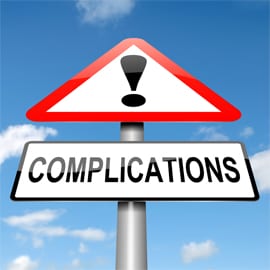The way your body digests food will change significantly after weight loss surgery. Though this will help you lose weight, it’s important to eat carefully and closely follow our instructions on how and what to eat. Adhering to your dietary guidelines and eating carefully will minimize your chances of experiencing digestive discomfort and unpleasant physical symptoms.
For the most part, dietary complications are minor and will pass quickly. Most of them can be relieved by making basic changes to your lifestyle and diet. However, if you find yourself dealing with persistent or unmanageable digestive symptoms, it’s best to bring them to our attention.

Gas
If you’re having problems with gas, your discomfort may stem from a few specific foods. Spicy foods, broccoli, cabbage and beans are well-known gas-producers and may need to be avoided or limited. Avoid drinking through straws to cut down on gas, as well.
Hair Loss
Sometimes, hair loss is a side effect of major surgery and rapid weight loss. To avoid this issue, take your multivitamin every day and be sure to eat enough protein.
Muscle Loss
As you lose weight, your body will start burning fat for energy. However, your body may at first think it’s starving and look for energy in other places like your muscles. This can result in muscle loss if you do not stay active. To prevent your body from depleting your muscles, keep your protein intake high and exercise every day.
Constipation
When you’re having trouble staying regular, it’s usually because you aren’t eating enough fiber. Add fiber to your diet slowly. This can be done by gradually introducing a natural fiber supplement like Metamucil or Benefiber. Exercising and staying hydrated can also help you avoid constipation.
Dumping Syndrome
If you’ve had gastric bypass, you’ll need to carefully avoid high-sugar foods like soda, fruit juice, candy, ice cream and pastries. Eating such items will push sugar into the small intestine at high volumes, causing problems like:
- Diarrhea
- Nausea
- Fatigue
- Sweating
- Dizziness
Abdominal cramping
When you think you may be experiencing dumping syndrome, find a place to lie down and rest until you feel better. Though these symptoms typically fade within 30 minutes, they can persist for more than two hours in some cases.
Nausea and Vomiting
After weight loss surgery, issues like these are usually caused by eating or drinking too much too fast. Remember that you will need to take your time and chew each bite thoroughly. You may also feel nauseous if you lie down quickly after eating or aren’t drinking enough water. If you continue to have problems with nausea and vomiting, returning to the previous stage of your diet can help.
Nutritional Deficiency
Your body needs many different vitamins and minerals to stay healthy, but your reduced stomach capacity will make it challenging to get them through your diet alone. To avoid a nutritional deficiency and the uncomfortable symptoms that can come with it, be sure to take your vitamin supplements every day and closely follow the eating guidelines provided by your nutritionist. Avoid empty calories like simple carbohydrates and instead focus on important nutrient sources like:
- Lean proteins (chicken, fish, legumes, nuts)
- Fortified cereals and whole grains
- Leafy green vegetables
- Low-fat dairy
- Fruits
If you’re having trouble getting any of these dietary difficulties under control, let us know so we can help you find a way to feel better.

